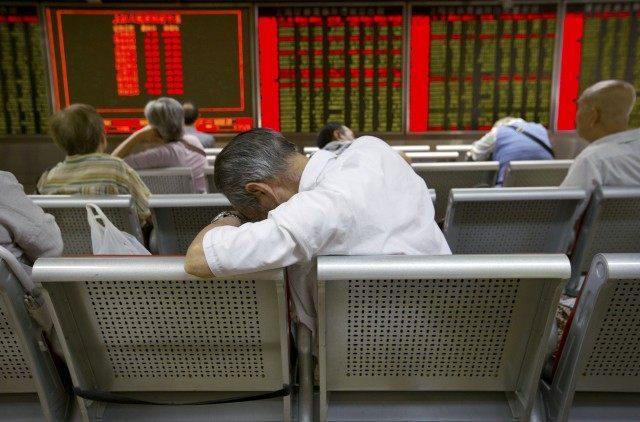Asian stocks were crushed across the board at midday trading after China cut employment for the twenty-second month in a row, as the nation’s General Manufacturing PMI™index deteriorated at its fastest rate since March 2009.
Also at midday, Japan shares had fallen 4 percent, and Hong Kong, Shanghai, and South Korea fell 2 percent. In Tuesday futures trading in Asia, the S&P 500 futures slumped by 1.6 percent while Dow futures fell 275 points.
Chinese manufacturers saw the quickest deterioration of operating conditions in August for the last six years, according to the Markit Caxin business survey data. New orders and new export business declined at much faster rates than the July contraction and contributed to the most rapid contraction of output since November 2011.
Lower production orders prompted companies to slash their purchasing activity at the fastest rate since March 2009, while weaker client demand led to the first rise in finished goods inventory in six months. Softer demand also led to price cutting that is accelerating China’s deflationary boom.
The Purchasing Managers’ Index™ (PMI™) registered at 47.3 in August, down from 47.8 in July. Any reading under 50 means business is contracting. The latest reading caps six months of continuous manufacturing contraction.
Purchasing managers suggested that August deteriorating market conditions were weakening client demand both at home and abroad. The biggest shortfall was in export business that declined at the steepest rate in just over two years.
Chinese manufacturing companies reduced their workforce numbers for the twenty-second month in a row in August. The rate of job cuts accelerated since July to a pace that was faster than June’s 76-month record.
Manufacturing firms in China signaled falling total input costs in August, with a number of monitored companies linking the decline to lower raw material costs to the thirteenth consecutive month of price deflation.
Dr. He Fan, Chief Economist at Caixin Insight Group stated:
The final Caixin China Manufacturing PMI for August continued to retreat, with sub-indices signaling continued weak demand in the markets for goods and factors of production. Recent volatilities in global financial markets could weigh down on the real economy, and a pessimistic outlook may become self-fulfilling. Macroeconomic regulations and controls must continue and fresh reform measures must be introduced.
Despite reports of collapsing data from private sources, Chinese Premier Li Keqiang said that the economy was showing signs of improvement after a series of measures to boost growth. China has slashed interest rates five times since November, and made repeated moves to let banks lend more of their deposits. It has also offered tax breaks for businesses and accelerated approvals for infrastructure projects.
In an unusual admission that business is slowing, China’s official government manufacturing purchasing managers’ index (PMI) was reported to have fallen to a 49.7 level in August from 50 in July, indicating a slight economic contraction.
Chinese authorities have punished 197 people for spreading rumors and false information online about the recent stock market crash and explosions in Tianjin that killed 150 people, officials told China’s official Xinhua News Agency. A journalist and stock market officials are among those arrested. Chinese authorities continue tightly to control online information and have previously prosecuted Internet users for spreading rumors.
In more bad news that for Chinese authorities, at least one person was killed when a chemical factory exploded in China’s Shandong province, according to the South China Morning Post. The blast is the province’s second chemical plant explosion in just over a week and comes on the heels of the deadly Tianjin explosion on Aug. The fire that followed the spectacular blast was brought under control about five hours later.
Stratfor Global Intelligence suggests, “The recent explosions in China illustrate the need for–and difficulty of– complying with safety and environmental regulations, particularly at a time of economic transition.”

COMMENTS
Please let us know if you're having issues with commenting.